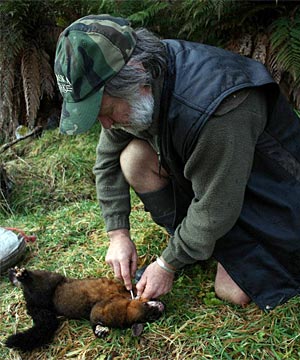Hunter/Trapper
Tasks & duties

Hunters and trappers may do some or all of the following:
-
hunt on foot, by helicopter or in a vehicle
-
track animals by checking the area for signs such as droppings or damage to vegetation
-
set the correct traps for each type of animal and lay poison
-
get the relevant approvals for using poison
-
notify relevant people in the area where traps and poison are set
-
mix bait to attract animals
-
inspect traps and bait stations and remove or dispose of animals
-
shoot animals (sometimes at night, which is known as spotlighting)
-
use maps of hunting areas to decide where to set traps
-
cut tracks for better access to traps and bait stations
-
skin animals
-
cut up carcasses
-
tag and release animals
-
Hunting guides may also:
-
entertain clients
-
transport clients to, and guide them around, hunting areas
-
find animals and advise clients about the quality of the trophy animal
-
prepare and take photographs of clients and their trophy
Specialisations
Professional Hunting Guide
Professional hunting guides take recreational hunters on hunting tours.
Fur Hunter
Fur hunters specialise in the recovery of animal fur to sell.
Skills & knowledge

Hunters and trappers need to have:
-
knowledge of the different types of traps and poisons used
-
skill in setting up traps and laying baits and poisons
-
good animal tracking skills to be able to recognise and follow signs that animals are in the area
-
knowledge of animal behaviour and where animal feeding places are
-
good shooting skills, particularly for hunting pests at night
-
knowledge of firearm care, safety and laws
-
animal skinning skills
-
knowledge of the outdoors, including the bush and mountain environment
-
awareness of environmental issues, ecology and safety rules
Entry requirements
There are no specific requirements to become a hunter and trapper, as most skills are learned on the job. However, courses are available in possum control.
Secondary education
There are no specific secondary education requirements. However, Sixth Form Certificate or NCEA equivalent is preferred.
Training on the job
Skills are gained on the job, and hunters and trappers can attend training courses on using chemicals and poisons.
Useful experience
Useful experience for hunters and trappers includes work in the bush and work involving livestock or farming. Experience in servicing machinery may also be useful.
Related courses
Pest and Weed Control
For more information, please refer to Career Services.
Document Actions
